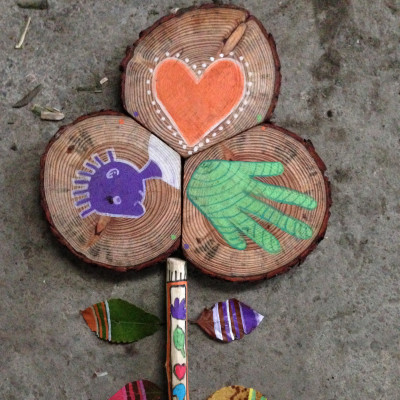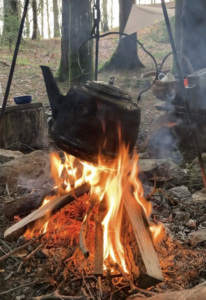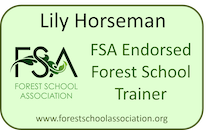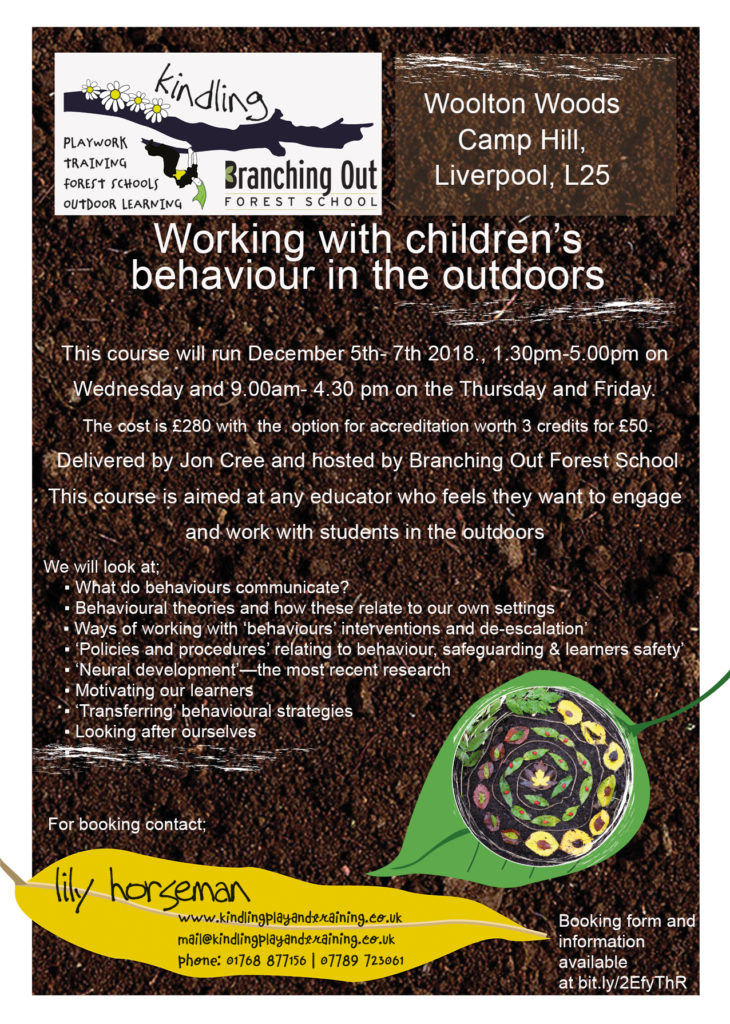Forest School Practitioner Training courses, outdoor workshops, creativity courses and more from Kindling Play and Training
If you wish to be added to the list a booking form will secure a place.
Kindling delivers RQF accredited Forest Schools Practitioner Training at NOCN (One Awards) Level 1 through to Level 3. These training courses can be delivered in house f the group size is viable. All courses are facilitated by Lily Horseman, an experienced and creative trainer and Forest School practitioner. Lily has held a Level 4 Forest School Trainers award since 2009, is a director and Chair of the Forest School Association. For more information or to ask questions call Lily on 07789 723 061 (please note that texts or WhatsApp messages may not receive a quick response, phone calls will receive a faster response).
Lily has demonstrated that Kindling Forest School training meets the criteria set out by the Forest School Association and has met the Quality Assurance benchmarks.
Click on an event for more information and to download booking forms.
Or filter events by category or tags below.

This is a 3 day OCNWMR accredited course worth 3 credits. Delivered by Lily Horseman in partnership with Jon Cree (chair of the Forest School Association).
We will delve into: what challenges us as leaders in the outdoors; theory on challenging behaviour, up-to-date neural research; triggers and causes for behaviour that challenges us, ways of dealing with ‘real life’ scenarios; de-escalation and formulating/reviewing your own policies, including looking at the validity of sanctions and rewards in a community based approach. We will look at how to develop our own empathetic responses to children and young people and how to react to their needs.
As this is an OCN Level 3 course worth 3 credits it will require participants to reflect on their own practice and write up a workbook after the course which we estimate would take approx 8 hours work. It is suitable for people who have trained as Forest School practitioners or who work in the outdoors.
“this course has really helped me re-appraise the way I work with some of our students and has actually given me new strategies for working with challenges that have worked!” ~ participant from February 2011 course
*This venue has basic accommodation on site which is included in the price. Other local accommodation is available.

27th-29th September finishing at lunchtime on the 3rd day.
This is a 3 day OCNWMR accredited course worth 3 credits. Delivered in partnership with Jon Cree.
We will delve into: what challenges us as leaders in the outdoors; theory on challenging behaviour, up-to-date neural research; triggers and causes for behaviour that challenges us, ways of dealing with ‘real life’ scenarios; de-escalation and formulating/reviewing your own policies, including looking at the validity of sanctions and rewards in a community based approach. We will look at how to develop our own empathetic responses to children and young people and how to react to their needs.
As this is an OCN Level 3 course worth 3 credits it will require participants to reflect on their own practice and write up a workbook after the course which we estimate would take approx 8 hours work. It is suitable for people who have trained as Forest School practitioners or who work in the outdoors.
“this course has really helped me re-appraise the way I work with some of our students and has actually given me new strategies for working with challenges that have worked!” ~ participant from February 2011 course
*This venue has basic accommodation on site which is included in the price. Other local accommodation is available.

21st-23rd March 2018 finishing at lunchtime on the 3rd day.
This is a 3 day OCNWMR accredited course worth 3 credits. Delivered in partnership with Jon Cree.
We will delve into: what challenges us as leaders in the outdoors; theory on behaviour, up-to-date neural research; triggers and causes for behaviour that challenges us, ways of dealing with ‘real life’ scenarios; de-escalation and formulating/reviewing your own policies, including looking at the validity of sanctions and rewards in a community based approach. We will look at how to develop our own empathetic responses to children and young people and how to react to their needs.
As this is an OCN Level 3 course worth 3 credits it will require participants to reflect on their own practice and write up a workbook after the course which we estimate would take approx 8 hours work. It is suitable for people who have trained as Forest School practitioners or who work in the outdoors.
“this course has really helped me re-appraise the way I work with some of our students and has actually given me new strategies for working with challenges that have worked!” ~ participant from February 2011 course
*This venue has basic accommodation on site which is included in the price. Other local accommodation is available.
This course will run December 5th- 7th 2018.
1.30pm-5.00pm on Wednesday and 9.00am- 4.30 pm on the Thursday and Friday.
The cost is £280 for the course. This course can be accredited as a level 3 award at an additional cost of £50. This accreditation will require some additional work and you can decide what you want to do at the end of the course. This is a level 3 OCNWMR accredited course worth 3 credits.
The course will be delivered by Jon Cree and hosted on the Branching Out Forest School site in Liverpool.
This course is aimed at any educator who feels they want to engage and work with students in the outdoors who may be reluctant learners (of any age).
We will look at;
- What do behaviours communicate?
- What is challenging behaviour, what challenges us as leader in the outdoors?
- Behavioural theories and how these relate to our own settings
- ‘Neural development’—the most recent research and how this affects triggers and causes for behaviour
- Causes of certain behaviours’—models for working with behaviour—the 3C’s, non violent communication and the pros and cons of rewards and sanctions’’? ‘What needs do the outdoors cater for?
- Ways of working with ‘behaviours’ interventions and de-escalation’ in the outdoors
- Motivating our learners
- ‘Transferring’ behavioural strategies from the outdoors to everyday life in educational settings and home
- Looking after ourselves
- ‘Policies and procedures’ relating to behaviour, safeguarding & learners safety’
To accredit this as an OCNWMR Level 3 course worth 3 credits it will require participants to reflect on their own practice and write up a workbook after the course which we estimate would take approx 8 hours work. It is suitable for people who have trained as Forest School practitioners or who work in the outdoors.
Jon Cree, training co-ordinator and 11 –19 programme manager at Bishops Wood Centre in Worcestershire, will be facilitating sessions that involve ‘real life’ scenarios, some outdoor exercises, as well as chats around the fire! Jon has been working with youth groups and groups of young people with specific needs, in the outdoors for almost 30 years.
Come and join us for a day exploring human needs!
 We will respond to the needs of the group (of course we will), but we anticipate that these ingredients will form part of our time together:
We will respond to the needs of the group (of course we will), but we anticipate that these ingredients will form part of our time together:
– Understanding needs, their relation to our behaviours and the behaviour of our participants;
– Unmet needs and what they might look like: how do we respond appropriately, and how do we look after needs in a time of dysregulation?
– Marrying up theories with our experiences and discussing the challenges of applying them;
– The dynamics and quality of human connection;
– Working with needs in nature and woodlands: the problems and possibilities.

Who is this for? Those who work in Forest School and other participant-centred settings as well as for those who aspire to develop their practice in this area. You may be experienced in theories but are looking for time and space to share experiences with others. Or you may be new to these ideas but are excited to learn.

The course will be facilitated by Lily Horseman and Froo Signore. As Forest School practitioners and facilitators they will draw from their own rich experience of relating theories and practice. There is nothing they like more than unpicking the juicy aspects of human behaviour and how this shows up in their session delivery.







